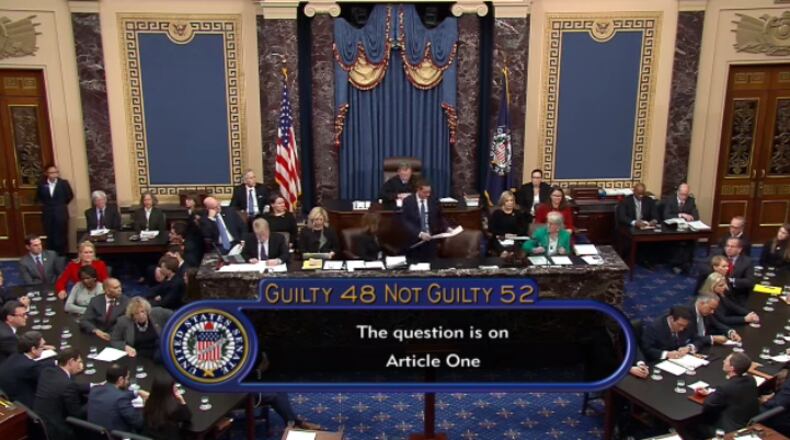"Exoneration comes when President Trump gets re-elected because the people of the United States are fed up with this crap," said Sen. Lindsey Graham (R-SC), a key ally of Mr. Trump.
The Senate voted 52-48 against the charge of abuse of power, and 53-47 against obstruction of Congress.
Like the impeachment votes against President Bill Clinton in February of 1999, neither charge received a majority vote in the Senate - but the major difference this time was that one member of the President's party switched sides, and voted for conviction.
Sen. Mitt Romney (R-UT) - his party's nominee for President in 2012 - said it was clear Mr. Trump had gone too far.
“With my vote, I will tell my children and their children, that I did my duty to the best of my ability, believing that my country expected it of me,” Romney said on the Senate floor, surprising his colleagues and the White House.
“We've come to different conclusions, fellow Senators,” Romney said, who at one point seemed to struggle with his emotions during his statement.
FULL REMARKS -- @SenatorRomney: "The grave question the Constitution tasks senators to answer is whether the president committed an act so extreme and egregious that it rises to the level of a high crime and misdemeanor. Yes, he did." pic.twitter.com/fbIhPG12IO
— CSPAN (@cspan) February 5, 2020
.@senatemajldr: "We simply cannot let factional fever break our institutions. It must work the other way." pic.twitter.com/uvsUkyPmJ4
— CSPAN (@cspan) February 5, 2020
Romney supported the abuse of power charge, but not the impeachment article on obstruction of Congress.
Republicans had hoped that several Democrats from Republican-leaning states would break with their leadership, and vote with the President - but that did not happen, as Sen. Doug Jones of Alabama, Sen. Kirsten Sinema of Arizona, and Sen. Joe Manchin of West Virginia announced they would vote to find the President, "Guilty."
"The evidence presented by the House Managers, including video testimony of witnesses under oath in the House of Representatives, clearly supports the charges brought against the President in the articles of impeachment," Manchin said in a written statement.
“I must vote yes on the articles of impeachment," Manchin added.
While Manchin may have surprised some, the decision by Jones - who could face former Senator Jeff Sessions in November - immediately drew GOP predictions that Jones would be a former Senator after 2020.
This has been a divisive time for our country, but as this chapter of history draws to a close, one thing is clear: our country deserves better than this. We must find a way to come together and to focus on what we have in common as Americans. https://t.co/xOjNuaQ3U1
— Doug Jones (@SenDougJones) February 5, 2020
With Chief Justice John Roberts back in the chair and presiding over the Senate, Senators were posed a simple question.
“Senators how say you? Is the defendant, Donald John Trump, guilty or not guilty?” the Chief Justice asked, starting the roll call votes before a hushed Senate chamber.
“Mr. Romney?” the reading clerk called. “Guilty,” Romney replied, as he was the only Senator to break ranks on either of the two impeachment votes.
Romney was swiftly attacked by Donald Trump Jr., who said the Utah Republican should be 'expelled' from the party.
It was the first time in U.S. history that a Senate impeachment vote had been bipartisan, as Romney voted for the first job, and against the second.
After the second vote was completed, the Chief Justice made one final declaration.
Chief Justice Roberts: "It is therefore ordered and adjudged that the said Donald John Trump be, and he is hereby, acquitted of the charges in said articles." pic.twitter.com/61M9Ugs72K
— CSPAN (@cspan) February 5, 2020
“”It is therefore ordered and adjudged that the said Donald John Trump be and hereby is acquitted.”
About the Author
